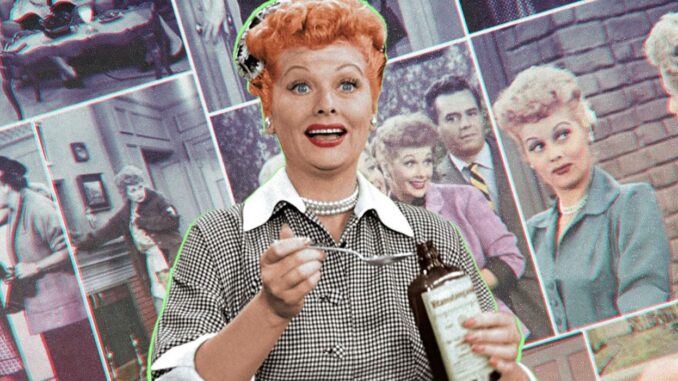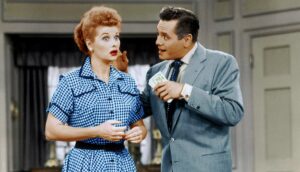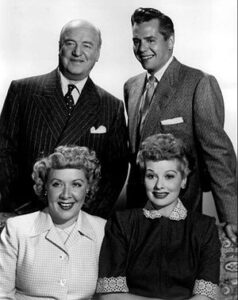
The groundbreaking sitcom I Love Lucy captivated audiences from the 1950s to today, setting the gold standard for television comedy. But behind the laugh tracks and comedic timing lay the brilliance of a talented Jewish writer whose creative vision turned a simple TV show into an unforgettable phenomenon. This article dives into the creative mind of I Love Lucy’s key writer, exploring how their wit, humor, and dedication helped bring Lucy Ricardo’s zany adventures to life. Let’s uncover how this Jewish writer’s influence made I Love Lucy the timeless masterpiece it is today.
Who Was the Genius Behind I Love Lucy?
Introducing the Writer Who Shaped TV Comedy Forever
Jess Oppenheimer, a highly skilled and innovative writer and producer, was the creative force behind I Love Lucy. Born into a Jewish family, Oppenheimer had an innate knack for storytelling and comedy. His experience in radio comedy and natural wit brought a unique charm to television that had never been seen before.
From Radio to TV: How Oppenheimer’s Journey Began
Oppenheimer’s early career in radio set him up for success in the world of television. He worked with popular comedy programs, including The Baby Snooks Show and Fibber McGee and Molly. His keen understanding of comedic timing, paired with his ability to write relatable and engaging characters, caught the attention of Desi Arnaz and Lucille Ball, the stars of I Love Lucy.
The Role of Jewish Humor in I Love Lucy

Infusing Comedy with Cultural Nuances
Oppenheimer’s Jewish background influenced the humor on I Love Lucy in subtle yet impactful ways. Jewish humor, known for its cleverness, irony, and ability to find light in dark situations, became a foundational part of the show’s appeal. Many of the show’s comedic elements—such as Lucy’s exaggerated antics, misunderstandings, and cultural clashes—are rooted in traditions of Jewish storytelling.
Blending Humor and Heart for Universal Appeal
Unlike many sitcoms of its time, I Love Lucy went beyond superficial laughs. Oppenheimer used humor as a vehicle to explore deeper themes of friendship, love, and ambition, making the show accessible to audiences from all walks of life.
How I Love Lucy Pioneered New Standards for Television Comedy
Breaking Boundaries with the Multi-Camera Technique
One of Oppenheimer’s most significant contributions was the multi-camera technique, which revolutionized television production. By using multiple cameras, I Love Lucy could be filmed in front of a live audience, creating an authentic comedic experience. This innovation made viewers feel like they were part of the audience, enhancing the overall enjoyment of the show.
Reinventing Comedy with Relatable Characters
Before I Love Lucy, TV characters were often one-dimensional, but Oppenheimer introduced multi-faceted characters with real-life quirks and dreams. Lucy Ricardo’s dream of stardom, combined with her eccentric antics, created a character audiences could empathize with and laugh at.
Crafting the Iconic Lucy and Ricky Dynamic
The Power of Relatable Relationships on Screen
Oppenheimer crafted a dynamic that was rare for its time—the comedic yet affectionate relationship between Lucy and Ricky Ricardo. Despite their arguments and misunderstandings, Lucy and Ricky had a deep bond that resonated with viewers. The characters’ chemistry and interactions helped build a foundation for the modern sitcom marriage.
Tackling Cultural Differences in a Humorous Way
Lucy’s marriage to Ricky, a Cuban-American, was groundbreaking. Through comedy, Oppenheimer subtly addressed cultural differences, creating humor that was both lighthearted and educational. This cross-cultural relationship added depth to the show, allowing audiences to see love beyond cultural barriers.
The Lasting Impact of Oppenheimer’s Writing on Modern TV
Paving the Way for Strong Female Characters
Oppenheimer’s portrayal of Lucy as a strong, independent woman was revolutionary. While Lucy’s plans often went hilariously awry, she was a determined character, unafraid to pursue her dreams. This portrayal laid the groundwork for future female characters who were multidimensional and driven.
Inspiring Future Comedians and Showrunners
Oppenheimer’s work on I Love Lucy influenced generations of comedians, writers, and producers. His knack for blending humor with relatable themes set a standard for shows like Friends, Seinfeld, and The Office, proving that well-crafted humor resonates with audiences for years to come.
The Jewish Influence That Shaped I Love Lucy

How Jewish Values Enhanced the Show’s Humanity
Jewish culture emphasizes resilience, humor, and the ability to laugh at oneself, all of which shone through in I Love Lucy. Oppenheimer’s background allowed him to infuse a universal warmth and humanity into the show, helping it stand out from other sitcoms of the era.
A Legacy Built on Wit and Wisdom
Jess Oppenheimer’s cultural identity played a role in his writing style, as he often found humor in life’s challenges. This wit and wisdom connected with viewers of all backgrounds, helping the show’s stories resonate worldwide.
What Made I Love Lucy So Endearing?
A Show That Was Ahead of Its Time
From pioneering production techniques to challenging social norms, I Love Lucy broke new ground in entertainment. The show’s timeless appeal can be traced back to Oppenheimer’s writing, which emphasized universal themes, clever humor, and genuine relationships.
H3: Celebrating Everyday Life Through Laughter
The comedy in I Love Lucy came from everyday scenarios that viewers could relate to. By highlighting the humor in daily life, Oppenheimer created a show that people of all generations could connect with, making it a beloved classic.
Conclusion: Oppenheimer’s Enduring Legacy
The success of I Love Lucy owes much to Jess Oppenheimer, the talented Jewish writer who shaped the series. His innovative storytelling, cultural influences, and knack for humor made I Love Lucy a timeless masterpiece that continues to capture hearts and bring laughter to millions. Through his work, Oppenheimer not only redefined what a sitcom could be but also left an enduring legacy that influences television comedy to this day.
FAQs
Q1: Who was the main writer behind I Love Lucy?
A: Jess Oppenheimer was the primary writer and producer, crafting much of the show’s iconic humor and relatable themes.
Q2: How did Oppenheimer’s Jewish heritage influence I Love Lucy?
A: His cultural background brought unique humor, resilience, and universal warmth, giving the show a relatable and timeless quality.
Q3: What production techniques did I Love Lucy pioneer?
A: I Love Lucy introduced the multi-camera filming technique in front of a live audience, enhancing the comedic experience.
Q4: Why is I Love Lucy considered a timeless classic?
A: The show’s relatable humor, endearing characters, and universal themes continue to resonate with audiences across generations.
Q5: How did Jess Oppenheimer influence future television comedies?
A: His blend of humor with heartfelt storytelling inspired future sitcoms, setting standards for shows like Friends and The Office.